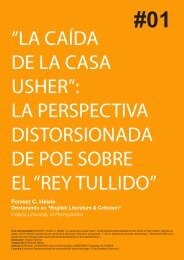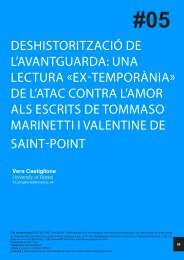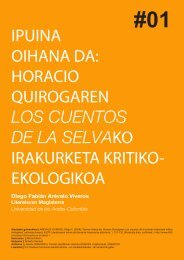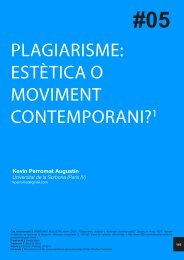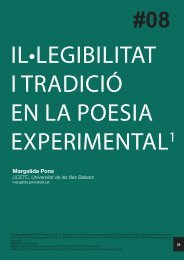a nation of ghosts?: haunting, historical memory and ... - 452ºF
a nation of ghosts?: haunting, historical memory and ... - 452ºF
a nation of ghosts?: haunting, historical memory and ... - 452ºF
Create successful ePaper yourself
Turn your PDF publications into a flip-book with our unique Google optimized e-Paper software.
the greatest inter<strong>nation</strong>al box-<strong>of</strong>fice hits <strong>of</strong> Spanish cinema <strong>of</strong> all time,<br />
with not apparent or obvious <strong>historical</strong> connections to the Spanish<br />
civil war or Franco’s dictatorship. The centrality <strong>of</strong> ghost narratives<br />
in these films <strong>and</strong> the present preoccupation with the resurgence <strong>of</strong><br />
a <strong>nation</strong>al repressed past cannot be mere coincidences. We should<br />
remember that one condition <strong>of</strong> <strong>ghosts</strong> is their elliptical nature, as well<br />
as the fact that they don’t make themselves visible to everybody 7 .<br />
Also, the trope <strong>of</strong> orphanhood, like the trope <strong>of</strong> <strong>ghosts</strong>, has a well<br />
established connection in post civil war Spanish culture, by referring<br />
elliptically to the unspeakable horrors <strong>of</strong> the past <strong>and</strong> the traumatized<br />
identities <strong>of</strong> its victims (Nada, Primera memoria, Cría cuervos, El<br />
desencanto, El Sur, Los niños de Rusia, El espinazo del diablo, just<br />
to name a few). Even Pedro Almodóvar’s recent films Volver <strong>and</strong><br />
La mala educación have a central ghostly component, where the<br />
main characters are haunted by the <strong>ghosts</strong> <strong>of</strong> the past, inevitably<br />
connected to the repressive <strong>nation</strong>al past. In these two cases,<br />
however, we encounter rather simulacra <strong>of</strong> <strong>ghosts</strong>, the disappeared<br />
who fake their return as <strong>ghosts</strong> (Volver), or the living who assume the<br />
personality <strong>of</strong> the deceased (Mala educación). But in either case, the<br />
emphasis is on the <strong>haunting</strong> nature <strong>of</strong> the past accosting the living,<br />
<strong>and</strong> its refusal to disappear. This connection should not be altogether<br />
too surprising, since the spectrality <strong>of</strong> the past <strong>and</strong> the postmodern<br />
recurring use <strong>of</strong> simulacra both refer to a void that needs to be filled<br />
in virtuality 8 .<br />
We can see that Spain’s <strong>historical</strong> trauma is the originating cause<br />
<strong>of</strong> these narratives populated by <strong>ghosts</strong>. The spectral nature <strong>of</strong> that<br />
past, full <strong>of</strong> voids, omissions, <strong>and</strong> disappearances, cannot form a<br />
continuous narrative without distortion. Below the smooth surface <strong>of</strong><br />
<strong>of</strong>ficial accounts <strong>of</strong> history, lie those stories that have been silenced<br />
<strong>and</strong> erased, leaving only their ghostly traces, <strong>and</strong> therefore bound to<br />
return <strong>and</strong> haunt the present. Ghost stories construct a representation<br />
<strong>of</strong> the past “as a <strong>haunting</strong>, rather than a reality immediately accessible<br />
to us” (Labanyi 2007, 112). Ghosts, as embodiment <strong>of</strong> the past in the<br />
present, destabilize the accepted notions <strong>of</strong> history, reality, <strong>and</strong> self,<br />
<strong>and</strong> the clear demarcations that define them. Their here-but-nothere<br />
borderline existence, between the dead <strong>and</strong> the living, blurs the<br />
binary divide that constructs our perception <strong>of</strong> reality. Ghosts remind<br />
us that we need to confront our past if we want to move ahead <strong>and</strong><br />
construct a better future.<br />
It seems evident that the reappearance <strong>of</strong> <strong>ghosts</strong> in Spanish post-<br />
Franco culture has almost everything to do with the repression <strong>of</strong><br />
the past, as an enforced prohibition during the dictatorship, <strong>and</strong><br />
as a political taboo derived from the “pact <strong>of</strong> forgetting” during the<br />
political transition. The return <strong>of</strong> the past in spectral form would be<br />
thus a symptom <strong>of</strong> the collective inability to deal with it properly, but<br />
it can also <strong>of</strong>fer the possibility <strong>of</strong> rectification, acknowledgement <strong>and</strong><br />
NOTES<br />
7 | Natalia Andrés del Pozo<br />
makes a convincing argument<br />
for the <strong>historical</strong> symbolism<br />
<strong>of</strong> <strong>ghosts</strong> in Juan Antonio<br />
Bayona´s El orfanato. Similarly,<br />
Acevedo-Muñoz has analyzed<br />
the <strong>nation</strong>al allegories <strong>of</strong><br />
the traumatic legacies <strong>of</strong> the<br />
repressed past in Alej<strong>and</strong>ro<br />
Amenábar´s Abre los ojos <strong>and</strong><br />
The Others. These films project<br />
the still unresolved questions<br />
<strong>of</strong> the <strong>nation</strong>al past onto the<br />
global scene, which coincides<br />
with the trans<strong>nation</strong>alization<br />
<strong>of</strong> memories <strong>and</strong> policies<br />
dealing with the past <strong>and</strong> the<br />
establishment <strong>of</strong> universal<br />
jurisdiction.<br />
8 | Interestingly, the<br />
Spanishness <strong>of</strong> some <strong>of</strong><br />
these films almost entirely<br />
disappears, as in The Others,<br />
which was shot directly in<br />
English with a complete cast<br />
<strong>of</strong> English actors. Thus not<br />
only the past is spectral, the<br />
very core <strong>of</strong> the movie is built<br />
around a void, an unspeakable<br />
unheimlich place, like the<br />
spaces left empty by thous<strong>and</strong>s<br />
<strong>of</strong> forced disappearances.<br />
A Nation <strong>of</strong> Ghosts?: Haunting, Historical Memory <strong>and</strong> Forgetting in Post-Franco Spain - José Colmeiro<br />
<strong>452ºF</strong>. #04 (2011) 17-34.<br />
31




